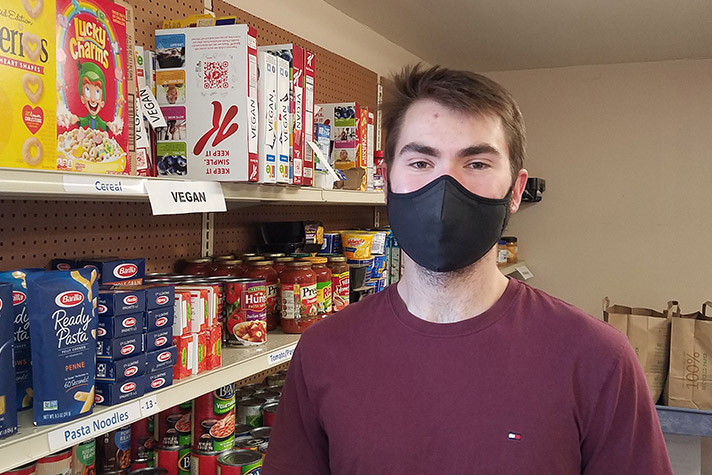RIT FoodShare student coordinator looks ahead to program’s future
Program celebrates six years of providing goods to students in need
RIT student Matt Ryan is FoodShare coordinator and is proud that the center has been able to provide for students throughout the pandemic.
For two years, RIT student Matt Ryan has worked with RIT’s FoodShare program, which is dedicated to serving and supporting the RIT community by providing free food to students in need. As the program coordinator, the fifth-year industrial and systems engineering major from Stratham, N.H., believes that its efforts to adapt to the changes that have come due to the COVID-19 pandemic are truly remarkable and the difference the program has made in the lives of students stands out.
How did you get involved with RIT FoodShare?
I got involved with RIT FoodShare when I worked as a residence adviser about two-and-a-half years ago. At the time, my responsibility included interacting with students who were checking in and checking out, in addition to working on inventory, restocking items, and making sure the place was clean and organized. There was an opening for a FoodShare coordinator, and so, after my experience as an RA, I moved into that role. Now, I help manage how the program runs, make sure that inventory is well supplied and events are coordinated, communicate with individuals about the program and help with the new bag pick-up model. I also process the orders and send them out for the staff to pack.
What was the inspiration behind RIT FoodShare?
A little more than six years ago, university associate Rebecca Johnson was working with a marketing class and mentioned that a lot of on-campus catered events often had a lot of food left over that went to waste. She was also aware of students who were not as fortunate as others and needed supplemental food. She decided to connect these challenges. FoodShare started as a Facebook page, which lives on today. If you have an event, someone can take a picture of the leftover food, post it, and invite students to take it.
At the same time, Sharon Kompalla-Porter, who was my boss and associate director in the Center for Residence Life, was working on a similar project to set up a food pantry. These two efforts combined and formed what is now RIT FoodShare, which has a permanent home in Riverknoll. This history has really been built on a sense of sharing what we have and caring for our community, and that culture has permeated throughout the history of FoodShare. We want to create an environment where people will not be judged for the situation they are in, and where it’s not overly burdensome to get help. A lot of college food pantries require students to fill out information about their backgrounds or situations, but we don’t require that. One of our core principles is to always provide free food and to never ask questions about someone’s situation.
How has COVID impacted RIT FoodShare?
Pre-COVID, FoodShare was open six days a week. Students could come in at any given time and shop around. We were operating using a grocery store model and there was a lot of interaction with our visitors at that time. The program has changed a lot since COVID. There was a lot of uncertainty, but we knew that this was an opportunity for us to step up and adapt our serving operations at a time when there was an immense need. We shifted to a bag pick-up model where students could make a request using a Campus Groups form, which we would process, have staff pick those items up, and keep them ready for the student to pick up. During my time at FoodShare, there has been an enormous amount of support for the center. We’ve been privileged as a community to receive the support to enable us to operate at a time where in-kind donations aren’t the major source of food that we distribute. Our whole operation changed once COVID occurred and we’ve done our best to adapt to serve the community.
What do you love about working at FoodShare?
For me, service is what stands out, not because I feel like I'm doing something good for the world around me, but because people around us are always going through something and at any given time we have an opportunity to improve that situation if we can. I’ve really enjoyed working at FoodShare because you know where the food is going. These are my peers, these are the people I go to class with. They’re my friends. There is an abundance of caring individuals that allow FoodShare to operate, and if I can help amplify that, it definitely is rewarding to me.
What are your hopes for the future of FoodShare?
I have big dreams for FoodShare and I think there are a lot of opportunities for the program. When you look at food pantries at other schools, FoodShare is definitely one of the more advanced, well-established programs. One thing I would love to see is a different location and a lot more fresh produce available. I would love an environment where people can pick up healthy options and a place that could act as a hub for providing other services, too. Right now, we have a small garden where we try to grow our own produce. Expanding the garden is something I would love to see, keeping in mind the supporting and caring vision upon which FoodShare was founded.
RIT FoodShare was created in 2014 in collaboration with RIT Student Government, School of Communication, RIT Sustainability, and Center for Residence Life.






